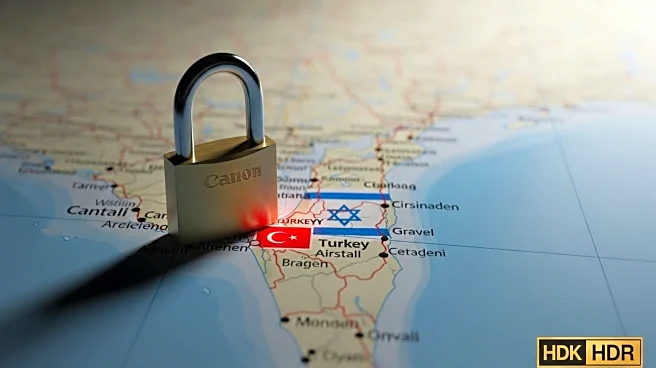What's Happening?
Turkey has announced the suspension of trade and airspace access to Israel, a move that reflects escalating tensions between the two nations. This decision was made public during a parliamentary session in Ankara, where Turkish Foreign Minister Hakan Fidan addressed the issue of Israel's attacks on Gaza. The suspension is seen as a significant diplomatic maneuver, although historical patterns suggest that such actions may not have a lasting impact. Israel has previously navigated similar restrictions imposed by Turkey, often finding ways to adapt through diversified supply chains and strategic redundancies.
Why It's Important?
The suspension of trade and airspace access by Turkey could have implications for both countries' economies and diplomatic relations. For Israel, the immediate impact may be mitigated by its ability to adapt to such restrictions, as evidenced by past experiences. However, the move signals a deterioration in bilateral relations, which could affect regional stability and cooperation. For Turkey, the decision to cut ties may serve as a political statement, but it also poses potential economic costs, as maintaining such restrictions could impact its own trade and diplomatic standing. The broader geopolitical landscape in the Middle East may be influenced by these developments, affecting alliances and regional dynamics.
What's Next?
The future of Turkey-Israel relations remains uncertain, with potential diplomatic negotiations or further escalations possible. Both countries may engage in back-channel discussions to address the underlying issues and explore avenues for restoring ties. Regional stakeholders, including other Middle Eastern nations and international bodies, may also play a role in mediating the situation. The impact on trade and airspace access will depend on the duration and enforcement of Turkey's suspension, as well as Israel's response and adaptation strategies.
Beyond the Headlines
The suspension of trade and airspace access highlights the complex interplay of political, economic, and security considerations in the Middle East. It underscores the challenges of balancing national interests with regional cooperation and stability. The move may also reflect broader geopolitical shifts, as countries reassess alliances and strategies in response to evolving threats and opportunities. The situation could prompt discussions on the role of international diplomacy and conflict resolution in addressing longstanding issues in the region.









